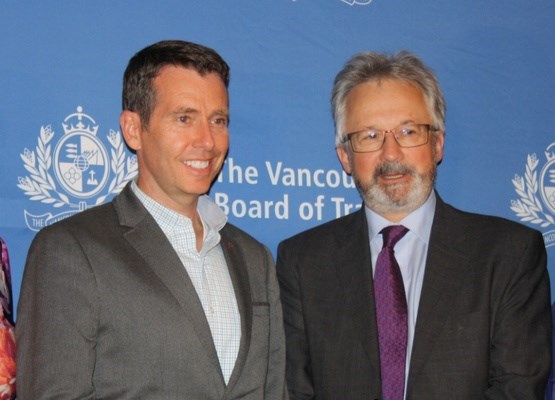The chief adviser to Uber says it’s a “shame” Vancouver isn’t on board with his company’s ridesharing and transportation service but he knows new technology can create conflict with various levels of government.
David Plouffe, who was speaking to the Vancouver Board of Trade Sept. 25, said Uber’s goal is to “build a city of the future” that works with tourism, grows wages and eases congestion.
“We’re eager to engage with local government, provincial government to find a way forward so that we can bring rideshare here,” said Plouffe, former senior adviser to U.S. President Barack Obama.
“Once we’ve kind of established the rules of how we can operate, then let’s work together on job-training programs, let’s think about how to move people with disabilities around better in the city.”
Uber customers use smartphones to order and pay for rides in vehicles, mostly with non-professional drivers behind the wheel.
Efforts to break into the Vancouver market have been met with resistance in the tax industry.
Vancouver cab companies launched a lawsuit in November 2014 seeking an injunction against Uber to prevent it from operating within the city.
Although it was not operating in Vancouver at the time of the lawsuit, Uber briefly provided services to locals in 2012.
But Uber pulled out of Vancouver after the B.C. government’s Passenger Transportation Branch determined the company was operating as a limo service and was required to fall in line with regulations covering that industry, such as charging a minimum of $75 per ride.
Plouffe told a packed ballroom the taxi industry doesn’t want its drivers to have other options but Uber would provide both professional and amateur drivers with other ways to make money with more flexible hours.
“In the history of humankind, anyone who has a monopoly doesn’t want to give it up, so I understand their perspective,” he said.
Plouffe declined to speak to reporters after his speech but Vancouver city Coun. Geoff Meggs, who sat at the head table with the Uber adviser, said he remained “skeptical” of some of Plouffe’s assertions.
“I’m not certain we’re seeing quality jobs generated here. We’re talking about work-sharing as well as ridesharing,” he said.
“By the same token, I don’t think people are saying I hope my kid becomes a very successful taxi driver. We hear talk about a taxi monopoly but I don’t think taxi-driving’s an easy or simple way to make a living.”
Meggs emphasized issues with ridesharing fall under provincial jurisdiction and he doesn’t think it’s the city’s job to lobby Victoria on behalf of the company.
“If Uber is looking for a handout from the City of Vancouver, they haven’t said so to me.”
For more business news go to biv.com



